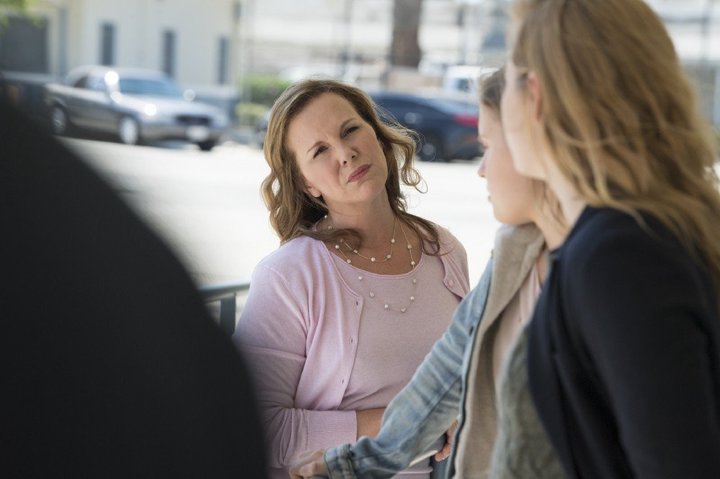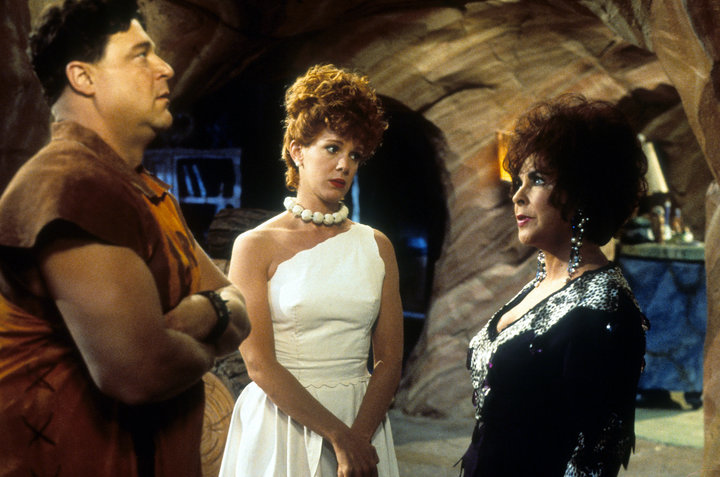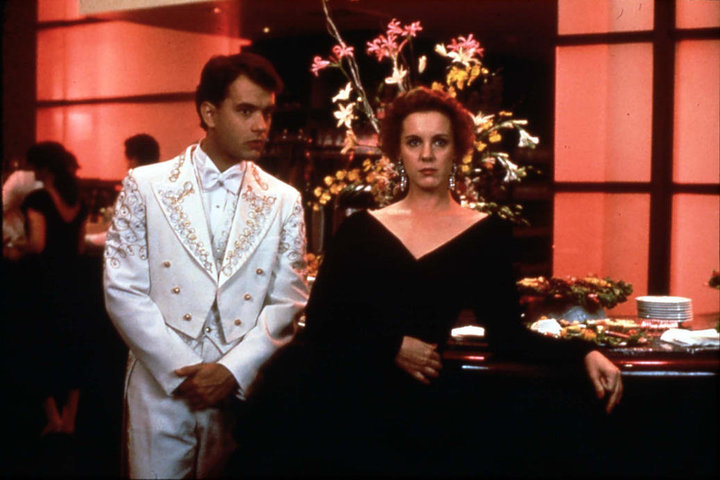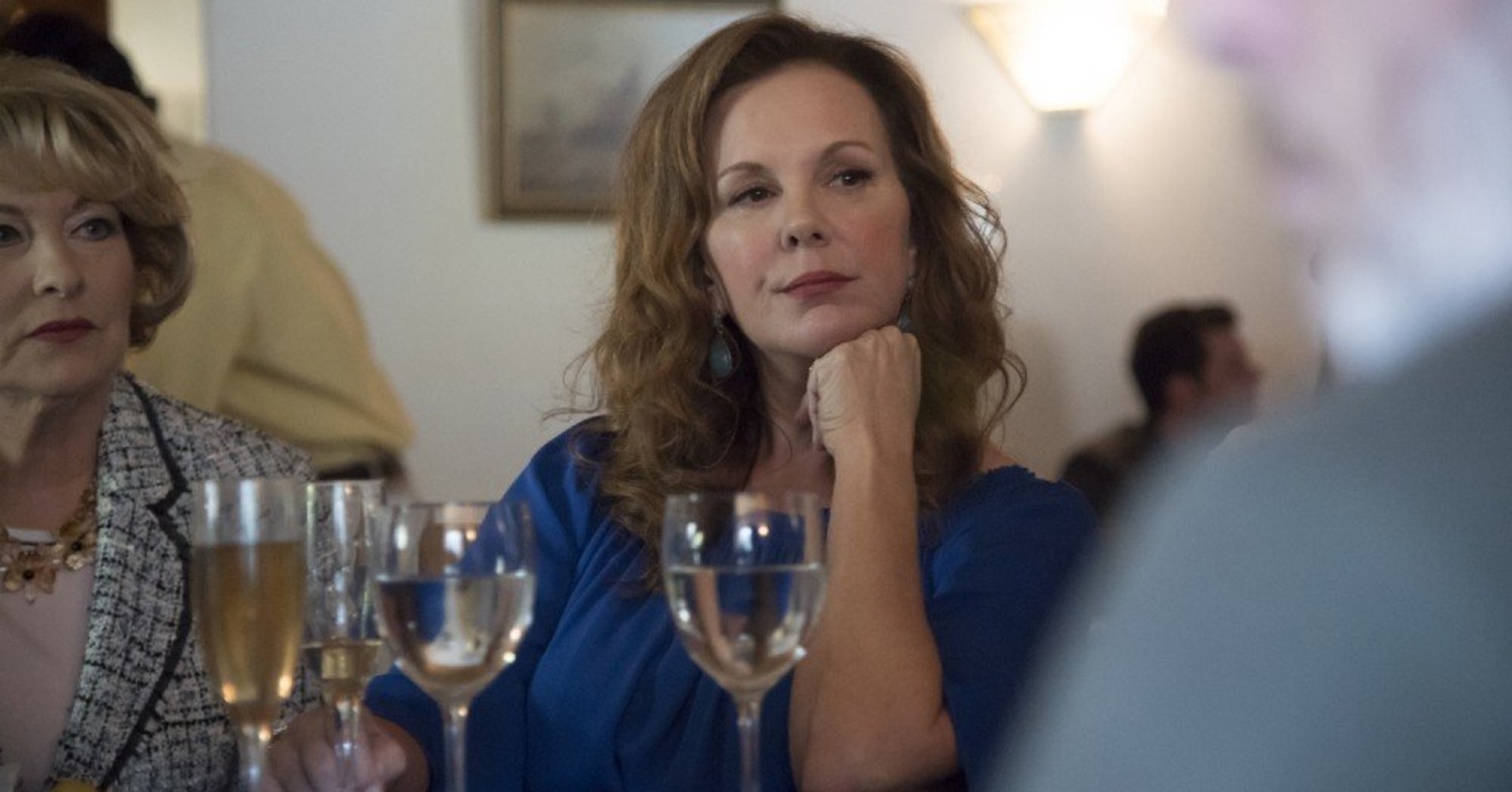[ad_1]
In “Sharp Objects,” our final glimpse of Jackie O’Neill, the ever-drunken busybody played by Elizabeth Perkins, finds her sauntering up to prison for a visit. She’s there to see the incarcerated Adora (Patricia Clarkson), who’s been accused of murdering the two Missouri teen girls at the center of the case Camille (Amy Adams) spent eight episodes investigating.
In typical Jackie fashion, she appears not to have a care in the world ― part of the well-worn armor that masks her dark, vulnerable solitude.
Strip the edge away, and Jackie is nothing if not fun, especially in the hands of Perkins, a chronically underrated actress who has barely gotten her due after more than three decades of feisty supporting parts. A few days before the finale brought this incredible show to a close ― or did it? ― Perkins called me to chat about all things “Sharp Objects,” including a nixed scene that would have revealed more of Adora’s fate.
Maybe we’ll see it in a second season that has yet to be confirmed, Perkins revealed.
Along the way, we also talked about “The Flintstones,” “Big,” why she hasn’t made a movie since 2005, her unwavering paranormal beliefs and Amy Adams’ excellence.
When’s the last time you were part of something that got this much attention?
Oh, “Weeds.” It also hit the zeitgeist at the time and was one of Showtime’s first series. I was just blessed with that incredible role of Celia, who was more fun to play than anything I’ve ever done.
Has it been hard to talk about “Sharp Objects” while the mystery is still unfolding for anyone who hasn’t read Gillian Flynn’s novel?
Yes, it has. But what’s great about it is that there are so many red herrings and so many pieces to the mystery that it’s pretty easy to lead people astray. The great thing about Jackie is that she knows everything. She knows what every single person is doing. She knows the relationship between everybody in town. She knows everything that’s gone on in the house. She knows Adora. She knows what’s going on with Amma and what’s going on with Camille and what happened with Marian. But she still doesn’t know how it’s all going to turn out. Nobody knows what the outcome is going to be, including Jackie.
In playing Jackie, did you want people to believe she could be responsible for the murders?
Well, in a way she is. Whether she’s directly involved or not, she’s obviously aware, especially after Episode 7, of what’s going on in the house. By Episode 7, we hear the word “Munchausen by proxy,” and Jackie O’Neill’s name is all over it. Even if she wasn’t directly responsible for the murders, she knows about the murders. So on that level, she is complicit. How responsible that makes her legally is a whole other conversation.

HBO
We know Jackie knows Adora killed Marian. Was your impression that she also knew that Amma had killed the two girls?
I don’t think she knows it. Adora knows everything. Adora runs the town. She’s the wealthiest person in town. She owns the only viable industry in town, the hog farm. Every road leads back to Adora. How specifically it leads back to Adora, I don’t think Jackie knows. But it always leads back to Adora. That’s the way Adora wants it.
And that’s part of her downfall.
Exactly. The story we shot was extremely linear, and what Jean-Marc Vallée did in eight months of editing is take this linear story that we created and turn it almost into a dreamlike situation, where everything is from Camille’s point of view and you’re only getting vignettes as they go by. For all of us, a large portion of decisions that we made as actors or decisions we made during scenes was then truncated to be, as I said, from Camille’s point of view, where you don’t know whether it’s a memory or it’s current or it’s in the future.
Seeing what Jean-Marc chooses to put out there is a surprise to all of us, and particularly in Episode 8. He decided to follow Camille to St. Louis and doesn’t really wrap up the story in Wind Gap with Adora, which I get, but it does sort of leave the door open to, “Well, what happened with Adora?” During the linear story, there was a big wrap-up of that. So whether or not that’s opening the door for another season, I don’t know. We definitely signed on for further seasons, so that’s a consideration. But it leaves a door open: How much did Adora know about Amma?
What was involved in the wrap-up that wasn’t included in the episode?
That Adora’s going to get out.
And she’s getting out because they realize she’s not the one who actually murdered the girls?
Exactly, and that they don’t really have proof that she murdered Marian, because they don’t really.
They don’t. And the pliers in Adora’s kitchen are clearly circumstantial.
And once they discover that it’s Amma, what have they arrested Adora for?
So they do discover that it’s Amma?
And Adora had no idea that it was Amma?
That’s kind of left up in the air. I do think the decision to tell it from Camille’s warped perspective was a brilliant choice, but it does leave a less linear story that I actually think created such a great mood and mystery to it. But it does make the linear story a little bit more vague. There’s good and bad things about that. As an actor, you’re like, “Wait! Where’s my stuff?” But as an audience, when you finish watching it, you’re like, “Why do I want to drink? And why is it so hot in here?” You can really feel everything that Camille is feeling, and that’s a real testament to who Jean-Marc Vallée is. He’s created an environment that you can taste and feel. I watched it in one sitting, and I was really burned out at the end. I was like, “Why do I want to drink bourbon right now? I don’t even like bourbon.” So that’s a real testament to the mood that he creates, and there’s something really riveting about that.
Was there a Jackie scene that didn’t make it into the series that you were particularly fond of?
Yeah, a particular one in Episode 8. I visit Adora at the prison.
And what was exchanged during that visit?
That she’s getting out.
Oh, so that’s when we would have found out?
Yes. And I get it, because that’s not really the story. For every actor, their story is the story [laughs]. You let go of that stuff when you work with Jean-Marc, and you kind of do it gladly because he’s the person you absolutely trust to tell the most interesting part of this. And this is Camille’s journey — it’s not Adora’s journey. The best solution is to follow them to St. Louis, but it did leave the Adora story wide open, which is in itself an interesting choice.
Between “Weeds” and “Sharp Objects,” you’ve explored your fair share of vampy alcoholics. Do you ever feel confined by a character like that?
No, directly the opposite, actually. I get really bored with people who aren’t battling a demon. I’ve done other shows where I describe them as, “Well, that’s pleasant. I’m being pleasant. I’m just a pleasant person.” But when you throw in people who really have something to hide or are struggling with a demon or are addicted or abusing themselves, it opens the door for a more creative expression. It gives you a backstory that determines every choice you make.
When seen through the lens of an alcoholic haze, it’s just more interesting. There’s pain there, there’s vulnerability there, there’s outrageousness there. There’s a person who’s acting like they probably wouldn’t without the addition of drugs and alcohol. So there’s a freedom to make choices that may be out of left field or not particularly understandable. There’s a freedom and a humor. I just find that to be a more well-rounded, interesting character to play. I’d much rather play somebody who’s really struggling than somebody who’s the head of a hospital who walks in and says, “We need to do this, stat.” I don’t think I could do those kind of roles. I could — I just find them really boring.

Archive Photos via Getty Images
You haven’t made a live-action movie since 2005. Is that why?
Oh, absolutely. I mean, who’s going to hire me in a movie? Television has replaced movies, in my opinion. It’s never been more obvious than it is right now, with movies either being really small indies or gigantic Marvels. There doesn’t seem to be a middle ground.
You beat out Geena Davis and Catherine O’Hara for “The Flinstones.” What did you envision your career looking like after making that movie?
I remember when they were casting it, I was like, “Well, this could be really bad.” I actually auditioned for it, and when they cast me, they said, “You have to know you’re the only person who came in with a Wilma voice and a Wilma hair and a Wilma outfit. You’re the only person who came in and presented the animated character who came to life.” And it wouldn’t have occurred to me to do otherwise. I know it was the same for Rosie O’Donnell — she came in as Betty Rubble. Once it was John Goodman, I thought, “Well, this is good because he’s a fantastic actor.”
That was the beginning of doing a lot of commercial stuff. I was in my 30s, and it was the ’80s and ’90s. That was great, but once you reach the age of 40, there’s not a lot of work in film. Not when you’re competing against Michelle Pfeiffer. So I started doing television, and now television is surpassing film in terms of stories. When you have shows like “Godless” and “Westworld” and “The Handmaid’s Tale,” you’re not going to see those movies being made. Like, I think “Godless” would have been an amazing movie, but they’re just not making them. I’m grateful that I can still work. I’m 58 in November, and I’m still being asked to do these really great roles, some larger, some smaller, but still really great roles. I just don’t have that opportunity in cinema anymore.
How do you think you are perceived as an actress?
I’ve never really thought about it. I don’t make giant career decisions. People will always say, “Well, maybe you should write, maybe you should direct, maybe you should produce.” I have absolutely no desire to do that. I’m very simple. If I read something and I like it, I do it. And if I read something and I don’t like it, I won’t do it. So I’ve never had any real trajectory or goal. I’ve never made decisions for my overall career. I’m a working actor. I go where the work is, and if it’s good I’m blessed. And I’ve been doing this for 35 years, so I’m really blessed.
In 1985, when talking about “About Last Night,” you said, “To be true to Joan, I spent a lot of time being miserable on the set.” To be true to Jackie on the set of “Sharp Objects,” were you —
Was I drunk the entire time?
Yeah, are you gossiping and drinking and vaping the whole time? What does being true to a character mean to you today?
Well, I do vape. Jean-Marc saw me doing that and was like, “Oh my God.” I was sitting in my chair one day on the set, and I was vaping. I don’t smoke nicotine. I just vape. I’m off nicotine. He said, “This has to be a part of Jackie. This is brilliant. You have to include this.” And that’s sort of who Jean-Marc is as a director.
In terms of “About Last Night,” which was my very first movie, that character of Joan really defined a part of my personality that I think I really have carried through most of my work, which is a deep sarcasm. That comes from my mom, this ironic look at life, that it’s all bullshit anyway and we might as well call a spade a spade. We should look at life through a lens of, “Really?” That is something that I carry with me, I think, through most of the things that I do. I always try and find the humor and sarcasm because through sarcasm there’s always a vulnerability. Anybody who’s throwing in a sarcasm obviously has some kind of pain or vulnerability or something that’s a thorn in their side. Perhaps that’s just the way I express myself.
Around that same time, you said, “I’m attracted to the Jekyll and Hydes of this world. Women who are eggs.” Do you think you’ve gotten to explore that Jekyll and Hyde-ness enough throughout your career?
Probably not, simply because I’m a middle-aged woman in Hollywood and I’m more of the best friend. I’m Eve Arden as opposed to Nicole Kidman. I never feel like, “Oh, this role is going to complete me.” I also think of a quote that Laurence Olivier said: “If you ever feel like you’ve reached 100 percent as an actor, you should just retire.” I think never being fully satisfied is just part of what we do, but I also look for that egg, that fragile outer shell that could crack at any moment and it’s all just going to come out.
My acting teacher from years ago, her name was Bella Itkin. I had a conversation with her once. I must have been 18. She said, “The key to playing someone who’s addicted is not to play the addiction, but play trying to hide the addiction.” So I don’t want anybody to know how screwed up I really am. There’s something about that mystery and keeping all of that shell around you that’s super fragile that’s very attractive. Inside the egg could be Jekyll or Hyde, and the outside could be Jekyll or Hyde, but there’s something you’re hiding, and that’s a very human through-line. We’re all hiding something. We’re all sitting on something. We’re all carrying something. Sometimes it’s a burden, and sometimes it’s a relief. But we’re all holding something, you know?
And yet, in terms of Jackie’s composure and how she presented herself, it often seemed like she was putting all her cards on the table, aside from the one dark secret she was sitting on. She wasn’t concealing her drunkenness, she’s vaping in the middle of Calhoun Day. Did you feel that way about her?
I think Jackie has balls. I think she is who she is, and she’s putting it out there. But I think it’s all a facade, as you see when she starts taking out the pills and saying, “This is who I really am.” You only know half the story. I loved the minute Adora says, “Inside voice, Jackie.” It’s the flamboyant, muumuu-wearing thing. She’s the only person who wears color in the whole show, and yet there’s even a deeper well inside.
It does sort of take you by surprise that her name is all over these files. Even though she’s out there with her current personality, that’s only half of it. I think she’s developed this persona as a way to protect herself against Adora. “I’m just going to be out there. If I have to sit on this, I might as well drink and do what I want.” I mean, the minute I saw the painting of herself over the fireplace, it was like, OK, this woman has no husband and no children; the only thing she can do is try and love herself. She sits there and looks at this painting at night, and that’s all she’s got.
No wonder she’s medicating in her own way.
One of the last movies you did was “The Ring Two,” and it’s my understanding that you are a big believer in the paranormal.
Is it a spooky experience to do a paranormal-type horror movie?
No, I’m not one of those actors who carries anything home other than, “God, my feet are tired.” I trained very extensively when I was young as an actor, and I’m not a person who holds onto that. I mean, this is very much my job.
But in terms of the paranormal, I believe in all kinds of scientific physics. I believe the world is made up of numbers and physics and everything has been created out of the law of physics. I believe in a collective consciousness. I believe in an energy. I’m not a religious person. I wouldn’t call myself an atheist, but I’m not religious. I believe more in the scientific physics of the world. So anything paranormal makes sense to me because there’s so much we don’t understand. There’s dimensions we don’t understand, there’s life we don’t understand. I don’t think our brains are capable of enveloping that or understanding how large this universe is. I’m like, “I’m just down here hanging upside down on a spinning planet in the middle of nowhere.” But yeah, I believe in all of it. For real.

Alamy
On a very different note, we just passed the 30th anniversary of “Big.”
I know, can you believe that was 30 years ago?
I can’t, and I rewatched it recently.
It’s rare to see a movie as endearing as that today.
Yeah! That’s exactly what I was saying earlier. We’re just not making stories. And Tom Hanks was so good in that movie. It was rereleased for a couple of days, and me and my kids and my husband were like, “Let’s go see it in a movie theater.” We went to a small little theater in Encino, and we got popcorn and we watched it. And we thought, “Well, that’s a good movie. Tom Hanks was really good in that movie!” You still believe it, and you still buy it.
It’s very odd to see yourself 30 years ago, but not in the way you would think, like, “Oh, I’ve gotten old.” That doesn’t cross my mind. It’s more of like, look at my hands. Look at the way I’m walking. Look at the way I’m moving my head. It’s like watching a home movie from 30 years ago that’s a full hour and a half. That was interesting.
As loving and lovable as “Big” is, there is a slightly creepy aspect to the seducing of the 13-year-old man-boy. What do you make of that reading?
I think our society has changed. At the time, it didn’t occur to (director) Penny Marshall, or to any of us actually, that that was a component. I believe our society has changed for the better, of course. And that’s just a little moment that probably wouldn’t exist if the movie was made now. But I don’t know what to say about it other than times were very different.
Totally. I don’t think it takes away from the movie, and it’s always a little wonky to hold older movies to today’s standards.
Right. But it’s so funny because all of a sudden somebody will reach out to me on social media, some oddball, who’s like, “You’re a pedophile!” Well, first of all, I’m an actor. And there’s not much you can really say about that other than what you just referenced. It didn’t occur to any of us that he would be mistaken for a 13-year-old boy when he’s an adult. It just wasn’t part of the vernacular at the time.
Right. I’ll close by asking you the same thing I asked Chris Messina a few weeks ago.
He’s wonderful to look at, wonderful to talk to.
He’s such a nice person. I adored working with him. Adored it. Yes, go ahead.
Other than “Sharp Objects,” what is your favorite Amy Adams performance?
Oh, there’s so many. Probably “Junebug.” She blew my mind in that, and I didn’t know who she was at the time. I’d seen her in supporting roles here and there, but “Junebug” just really drove it home. And then after that, I’d have to say “Arrival.” The fact that she wasn’t nominated [for an Oscar] for that is just astounding. But I would say “Junebug.”
[ad_2]
Source link

